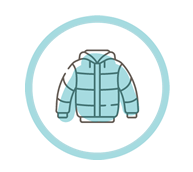Table of Contents
Winter is almost here, and while there can be something enjoyable about cozy nights, you may notice your body reacting unexpectedly when the temperature drops. For some, stepping outside on a brisk morning can cause coughing, while others experience chest discomfort or pain. This response to cold air is common, especially for those with underlying respiratory conditions like bronchiectasis or COPD.
Chest pain in cold weather is never comfortable. In this article, we’ll answer your questions about how cold air affects the respiratory system.
The Impact of Cold Weather on the Body
 With colder temperatures and dry air conditions, winter can make breathing more difficult, putting additional strain on your lungs: “For people with COPD, cold air can trigger spasms in the lungs, creating symptoms similar to an asthma attack…you also may feel a bit of tightness in the chest…”1
With colder temperatures and dry air conditions, winter can make breathing more difficult, putting additional strain on your lungs: “For people with COPD, cold air can trigger spasms in the lungs, creating symptoms similar to an asthma attack…you also may feel a bit of tightness in the chest…”1
Cold, dry air can irritate lungs, causing the upper airways to narrow (bronchoconstriction).2 While this doesn’t just affect people living with a lung condition, it can be particularly challenging for those with bronchiectasis, COPD or asthma. For some, winter weather can make symptoms worse.
Chest pain in cold weather is a common occurrence for some people. Here’s why: When there are temperature extremes, our bodies work hard to regulate our internal temperature. When it’s hot, sweating helps keep us cool. When the air is cold, our blood vessels and arteries narrow to keep the heat inside our bodies. Our heart has to work harder to pump blood and oxygen through the newly constricted veins and arteries, which can raise blood pressure. 3
High blood pressure in your lung arteries (also known as pulmonary hypertension) can affect the arteries carrying blood to the lungs and contribute to chest pain. 4
Why Does Cold Air Make Me Cough?
When we breathe, air enters the body through one of two entry points: the nose or mouth. These passageways work to warm and humidify the air before it reaches our lungs, which makes it easier to breathe.
When that air is cold or dry, our nose and mouth have a harder time warming up this airflow. And when cold air enters the airways, our lungs naturally begin to tighten: “Cold air contains less moisture, and breathing it in can dry out the airways. This can cause the airways to spasm, triggering an asthma attack, which can involve coughing.” 5
The Connection Between Cold Air and Wheezing
Colder air is dryer and the dryness can irritate your lungs, leading to increased wheezing, coughing, and shortness of breath.6 As our airways narrow, you might hear a high-pitched whistling as you breathe— the result of our narrowed walls vibrating.7
Dry air can also cause dehydration, which is bad news for our overall health. We need fluid to produce mucus, and mucus helps trap airborne bacteria, germs, and dust. Without enough of a protective mucus layer, we might be more prone to infection. 8
TO READ: COPD and Cold Weather Tips
How to Relieve Chest Pain Due to Cold Weather
You can take steps during the winter months to protect your lungs.
Breathe Easier: Tips for Spending Time Outdoors




Breathe Easier: Tips for Spending Time Indoors
Indoor air conditions can also be harmful for those managing a chronic lung condition. Here are some ways to prevent inflammation and potential flare-ups.





What’s the Best Climate for Lung Conditions?
Hot and humid or cold and dry climates can create uncomfortable living conditions for those with a lung condition.9 However, even in optimal conditions, there will be environmental factors that may impact your ability to breathe naturally.
Here are a few common airborne irritants that can impact your lungs:
- Second-hand smoke
- Chimney fumes
- Outdoor air pollutants
- Aerosol products
- Insecticides
- Cleaning products
- Mold, dust and mildew 10
The truth is: there’s no perfect climate condition for a lung disease. The important thing is to find and follow management techniques recommended by your healthcare provider.
Breathe Easier This Season
Luckily, there are a few ways you can minimize chest pain in cold weather including working with your healthcare team, maintaining regular airway clearance therapy, and taking a few extra precautions. If you haven’t experienced the benefits of using The SmartVest Airway Clearance System, it may be time to explore this option.
Learn more by requesting an informational packet. Questions? Speak with one of our patient care advocates by calling them at 1.855.528.5690. You can also schedule a time at the link below, and a member of our team will call you.
Resources
1 Cleveland Clinic. “How Cold Weather Can Spell Trouble for Your Heart and Lungs.” Retrieved from https://health.clevelandclinic.org/how-cold-weather-can-spell-trouble-for-your-heart-and-lungs/
2 Harvard Health Publishing. “7 Strategies to Fight Winter Breathing Problems.” Retrieved from https://www.health.harvard.edu/staying-healthy/7-strategies-to-fight-winter-breathing-problems
3 Mayo Clinic. “Blood Pressure. Is It Affected by Cold Weather?” Retrieved from https://www.mayoclinic.org/diseases-conditions/high-blood-pressure/expert-answers/blood-pressure/faq-20058250
4 Mayo Clinic. “Chest Pain.” Retrieved from https://www.mayoclinic.org/diseases-conditions/chest-pain/symptoms-causes/syc-20370838
5 Medical News Today. “What to know about cold-induced asthma.” Retrieved from https://www.medicalnewstoday.com/articles/325492
6 American Lung Association. “Weather and Your Lungs.” Retrieved from https://www.lung.org/blog/weather-and-your-lungs
7 Medical News Today. “What’s the difference between expiratory and inspiratory wheezing?” Retrieved from https://www.medicalnewstoday.com/articles/325370
8 Cleveland Clinic. “How Dry Winter Air Can Cause Respiratory Problems— From Bronchitis to Nosebleeds.” Retrieved from https://health.clevelandclinic.org/can-best-combat-effects-dry-winter-air/
9 American Lung Association. “Weather and Your Lungs.” Retrieved from https://www.lung.org/blog/weather-and-your-lungs
10 Cleveland Clinic. “5 Tips to Help You Breathe Easier in Hot or Cold Climates.” Retrieved from https://health.clevelandclinic.org/5-tips-to-help-you-breathe-easier-in-hot-or-cold-weather/
11 Mayo Clinic Health System. “Is the extreme cold bad for your lungs?” Retrieved from https://www.mayoclinichealthsystem.org/hometown-health/speaking-of-health/is-the-extreme-cold-bad-for-your-lungs
12 U.S. Centers for Disease Control and Prevention (CDC). “About Handwashing” Retrieved from https://www.cdc.gov/clean-hands/about/index.html
13 National Health Service (NHS). “Bronchiectasis” Retrieved from https://www.nhs.uk/conditions/bronchiectasis






